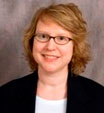Rebecca Rourke Edwards ’90, associate professor of history at Rochester Institute of Technology and an expert in deaf history and culture, will present a free public lecture titled “Seeing the Signs: Doing Deaf History at Holy Cross and Beyond” on Thursday, Sept. 20, at 4:30 p.m., in the Rehm Library, Smith Hall. A sign language interpreter will be present. Copies of her book “Words Made Flesh: Nineteenth Century Deaf Education and the Growth of Deaf Culture” (NYU Press, 2012) will be available for purchase in Rehm Library, and she will be available to sign them immediately following her talk.
Edwards’s talk is part of a yearlong series of events reflecting on and celebrating 40 years of coeducation at Holy Cross, said history professor and department chair Mark Lincicome. The history department and the American Sign Language, Deaf Studies Program, and The Alexander F. Carson Lecture Series are sponsoring this event.
Edwards, who chairs her department, joined the RIT faculty in 1998 after earning a Ph.D. in American history at the University of Rochester. Her research is focused on the impact of deaf individuals in society, and changes in the societal and sociological understanding of deafness. Her book, “Words Made Flesh” “explores the educational battles of the nineteenth century … and explains how the unexpected emergence of Deafness (as a culture) provoked the pedagogical battles that … still reverberate today.” The roots of her book can be found in the research she conducted as a Fenwick Scholar at Holy Cross.
“I’m not sure that I would have become a professor without the Fenwick Scholar Program,” said Edwards. “It allowed me to spend senior year researching my project, ‘Signs of Culture: Deafness in 19th Century America.’ I was the youngest person doing full-time research at the American Antiquarian Society that year. With strong encouragement from history professor emeritus Ross Beales and others, I found a way to combine my academic work with the personal interest in deaf history that I brought to Holy Cross.” 
RIT Professor Edwards '90 to Give Talk on Deaf Culture
Event is part of yearlong series celebrating four decades of coeducation at Holy Cross
Read Time
1 Minute

